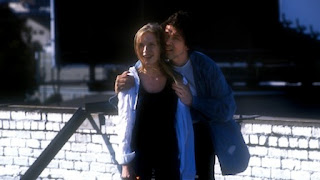Werth: Hi, Wise. What's with the mega-jumbo-latte and the Times' real estate section?
Wise: My insomnia has been acting up lately, and I've been fantasizing about a boondock cottage somewhere I can catch up on sleep.
Werth: One thing all New Yorkers have in common is the urge to sprint for the nearest railroad station to catch a train to our favorite out-of-town refuge whenever New York City life gets a little too... well, New York City.
Wise: Based on Peter Cameron's novel, The Weekend (1999) follows Lyle (David Conrad) as he and his new (and much younger) boyfriend Robert (James Duval) flee New York City for a quiet getaway at the upstate home of his old friends Marian and John (Deborah Kara Unger and Madmen's Jared Harris). Unfortunately, the weekend retreat turns out to be anything but quiet as long held frustrations, sorrows and resentments begin to surface, particularly Marion's complicated feelings for Lyle's deceased partner Tony (D.B. Sweeney).
Werth: She obviously watched The Cutting Edge one too many times.
Wise: Adding to the tumult is their glamorous but sharp-tonged neighbor Laura Ponti (Gena Rowlands), her snappish actress daughter Nina (Brooke Shields), and Nina's married lover Thierry (Gary Dourdan). Despite the large cast, the film is composed mostly of small scenes between pairs of characters, interspersed occasionally with blued-tinged flashbacks to Tony's past bons mots that feel something like an old Calvin Klein fragrance ad.
Werth: Don't you mean like an old Calvin Klein jeans ad?
Wise: I have to admit that I've avoided this film for over a decade because the novel it's based on is one of my favorites, and I was worried that Cameron's treasure box could only be butchered onscreen. And it turns out that I was only half right. Writer/director Brian Skeet has an instinctive feel for the rhythms of Cameron's prose, capturing the languorous feeling of the country after escaping the fetid heat of the city. If anything, he's perhaps too respectful of Cameron's words, cramming in entire passages of dialogue that feel spare within the expanse of a novel, but overblown on film.
Werth: Show it, don't say it, Skeet!
Wise: Still, Skeet gets a lot more more right than wrong. He is not slavishly faithful to his source, adapting and enriching the more cinematic parts of the book, eliding the rest. The cast is almost uniformly excellent, particularly Rowlands, who is at the center of the most lively scenes, and Unger, who manages to portray both her character's unlikability and her emotional frailty. Less successful is Sweeney who is forced to play more of a symbol than a character and whose Long Island inflection makes a stark contrast to Tony's platitudinousness while being posed like The Dying Gaul.
Werth: At the beginning of Billy Wilder's The Lost Weekend (1945) the main character is also packing for a trip to the country to get away from New York City. But Don Birnam (Ray Milland) quickly decides that instead of leaving by way of Metro North, he will take his usual escape route through a bottle of rye. You see, Don is a raging alcoholic.
Wise: Which is a lot cheaper than a house in the Hamptons.
Werth: Don handily ditches his well-meaning brother Wick (Phillip Terry, who at the time was spoused up with Joan Crawford) and his "best girl," the ritzy Helen St. James (the doe-eyed Jane Wyman wearing leopard courtesy of Edith Head) and begins a four day drinking binge that would put Mel Gibson to shame.
Before the film is done, Don is kicked out of his favorite bar, installed in a drunk tank, and roams up and down Third Avenue looking for a pawn shop that is open on Yom Kippur.
Wise: Clearly he should be taking the Day of atonement a bit more seriously.
Werth: Before its treacly ending, Lost Weekend is a disturbing look at how the mind of an alcoholic works—or doesn't work. Milland doesn't play for sympathy, his silky, gentlemanly demeanor turning into a web of disgusting lies, selfishness and criminality as he descends into a gin-fueled spiral. But because he's Ray Milland, we also can't bring ourselves to hate this jerk. He knows how pathetic he is, he is just powerless to stop himself from pursuing the next drink.
Wilder works his typical magic with story rather than a flashy cinematic style, but he does take the time to have fun with closeups on a booze-filled shot glass, water rings on the bar, and a DT fantasy with a bat and a mouse that is laughable until it's not.
The film made quite an impact when it was released—winning four Oscars including Best Picture, Best Director and Best Actor for Milland—but perhaps the most definitive proof of its popularity is that two years later the film was spoofed in the Bugs Bunny cartoon "Split Hare".
Wise: What's up, Drunk?
Werth: Whether you're packing your bags, or blacking out, join us next week for more Film Gab!












No comments:
Post a Comment